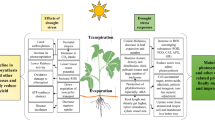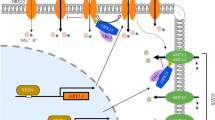Abstract
Water deficit is a key limiting factor for maize (Zea mays L.) productivity. Elucidating the molecular regulatory networks of stress tolerance is crucial for genetic enhancement of drought tolerance. Two genotypes of maize contrasting in their yield response to water deficit were evaluated for tolerance traits of water relations, net CO2 assimilation rate, antioxidative metabolism and grain yield in relation to the expression levels, based on transcription profiling of genes involved in stress signaling, protein processing and energy metabolism to identify functional tolerance mechanisms. In the genotype SNJ201126 upregulation of calcium mediated signaling, plasma membrane and tonoplast intrinsic proteins and the membrane associated transporters contributed to better maintenance of water relations as evident from the higher relative water content and stomatal conductance at seedling and anthesis stages coupled with robust photosynthetic capacity and antioxidative metabolism. Further the protein folding machinery consisting of calnexin/calreticulin (CNX/CRT) cycle was significantly upregulated only in SNJ201126. While the down regulation of genes involved in photosystems and the enzymes of carbon fixation led to the relative susceptibility of genotype HKI161 in terms of reduced net CO2 assimilation rate, biomass and grain yield. Our results provide new insight into intrinsic functional mechanisms related to tolerance in maize.





Similar content being viewed by others
Data availability
The transcriptome data of two maize genotypes HKI161 and SNJ201126 under well-watered and water deficit stress conditions has been deposited at NCBI under the BioProject number PRJNA436078. The sequencing data was deposited in the Sequence Read Archive database under the accession number SRP133547.
References
Baldoni E, Genga A, Cominelli E (2015) Plant MYB transcription factors: their role in drought response mechanisms. Int J Mol Sci 16:15811–15851. https://doi.org/10.3390/ijms160715811
Bars HD, Weatherly PE (1962) A re-examination of the relative turgidity technique for estimating water deficits in leaves. Aus J Biol Sci 24:519–570
Beaugelin I, Chevalier A, D’Alessandro S, Ksas B, Havaux M (2020) Endoplasmic reticulum-mediated unfolded protein response is an integral part of singlet oxygen signalling in plants. Plant J. https://doi.org/10.1111/tpj.14700
Bigeard J, Hirt H (2018) Nuclear signaling of plant MAPKs. Front Plant Sci 9:469. https://doi.org/10.3389/fpls.2018.00469
Bolaòos J, Edmeades G, O, (1993) Eight cycles of selection for drought tolerance in lowland tropical maize I responses in grain yield, biomass and radiation utilization. Field Crops Res 31:233–252
Chance B, Machly AC (1955) Assay of catalase and peroxidases. Methods Enzymol 2:764–775
Claiborne A (1985) Catalase activity. In: Greenwald RA (ed) CRC handbook of methods for oxygen radical research. CRC Press, Boca Raton, pp 283–284
Cui XH, Hao FS, Chen H, Chen J, Wang XC (2008) Expression of the Vicia faba VfPIP1 gene in Arabidopsis thaliana plants improves their drought resistance. J Plant Res 121:207–214. https://doi.org/10.1007/s10265-007-0130-z
De Souza A, Wang J-Z, Dehesh K (2017) Retrograde signals: integrators of interorganellar communication and orchestrators of plant development. Ann Rev Plant Biol 68:85–108. https://doi.org/10.1146/annurev-arplant-042916-041007
Dhindsa RS, Dhindsa PP, Throne TA (1981) Leaf senescence: correlated with increased levels of membrane permeability and lipid peroxidation and decreased levels of superoxide dismutase and catalase. J Exp Bot 32:93–101
Feller U, Vaseva II (2014) Extreme climatic events: Impacts of drought and high temperature on physiological processes in agronomically important plants. Front Environ Sci 2:39. https://doi.org/10.3389/fenvs.2014.00039
Fu C, Liu XX, Yang WW, Zhao CM, Liu J (2016) Enhanced salt tolerance in tomato plants constitutively expressing heat-shock protein in the endoplasmic reticulum. Genet Mol Res. https://doi.org/10.4238/gmr.15028301
Hamberger B, Ellis M, Friedmann M, CdeA S, Barbazuk B, Douglas CJ (2007) Genome-wide analyses of phenylpropanoid-related genes in Populus trichocarpa, Arabidopsis thaliana, and Oryza sativa: the Populus lignin toolbox and conservation and diversification of angiosperm gene families. Canadian J Bot 85:1182–1201. https://doi.org/10.1139/b07-098
Jia XY, Xu CY, Jing RL, Li RZ, Mao XG, Wang JP, Chang XP (2008) Molecular cloning and characterization of wheat calreticulin (CRT) gene involved in drought-stressed responses. J Exp Bot 59:739–751. https://doi.org/10.1093/jxb/erm369
Kang J, Hwang JU, Lee M, Kim YY, Assmann SM, Martinoia E, Lee Y (2010) PDR-type ABC transporter mediates cellular uptake of the phyto abscisic acid. Proc Natl Acad Sci USA 107:2355–2360. https://doi.org/10.1073/pnas.0909222107
Khanna Chopra R, Maheswari M (1998) Effect of altering source availability on expression of sink capacity in a maize hybrid and its parents. Eur J Agron 9:101–107. https://doi.org/10.1016/s1161-0301(98)00028-8
Li MJ, Qiao Y, Li YQ, Shi ZL, Zhang N, Bi CL, Guo GK (2016) A R2R3-MYB transcription factor gene in common wheat (namely TaMYBsm1) involved in enhancement of drought tolerance in transgenic Arabidopsis. J Plant Res 129:1097. https://doi.org/10.1007/s10265-016-0857-5
Liu JX, Howell SH (2010) Endoplasmic reticulum protein quality control and its relationship to environmental stress responses in plants. Plant Cell 22:2930–2942. https://doi.org/10.1105/tpc.110.078154
Livak KJ, Schmittgen TD (2001) Analysis of relative gene expression data using real-time quantitative PCR and the 2−ΔΔCT method. Methods 25:402–408. https://doi.org/10.1006/meth.2001.1262
Lobell DB, Roberts MJ, Schlenker W, Braun N, Little BB, Rejesus RM, Hammer GL (2014) Greater sensitivity to drought accompanies maize yield increase in the US Midwest. Science 344:516–519. https://doi.org/10.1126/science.1251423
Maheswari M, Yadav SK, Shanker AK, Anil Kumar M, Venkateswarlu B (2012) Overview of plant stresses: mechanisms, adaptations and research pursuit. In: Venkateswarlu B, Shanker AK, Maheswari M (eds) Crop stress and its management: perspectives and strategies, Dordrecht, Springer, pp 1–18. https://doi.org/10.1007/978-94-007-2220-0
Maheswari M, Vijayalakshmi T, Varalaxmi Y, Sarkar B, Yadav SK, Singh J, Seshu Babu G, Kumar A, Sushma A, Jyothilakshmi N, Vanaja M (2016) Functional mechanisms of drought tolerance in maize through phenotyping and genotyping under well-watered and water stressed conditions. Eur J Agron 79:43–57. https://doi.org/10.1016/j.eja.2016.05.008
Mega R, Abe F, Kim JS, Tsuboi Y, Tanaka K, Kobayashi H, Sakata Y, Hanada K, Tsujimoto H, Kikuchi J, Cutler SR, Okamoto M (2019) Tuning water-use efficiency and drought tolerance in wheat using abscisic acid receptors. Nat Plants 5:153–159. https://doi.org/10.1038/s41477-019-0361-8
Miao Z, Han Z, Zhang T, Chen S, Ma C (2017) A systems approach to spatio-temporal understanding of the drought stress response in maize. Sci Rep 7:6590. https://doi.org/10.1038/s41598-017-06929-y
Mir RR, Zaman-Allah M, Sreenivasulu N, Trethowan R, Varshney RK (2012) Integrated genomics, physiology and breeding approaches for improving drought tolerance in crops. Theor Appl Genet 125:625–645. https://doi.org/10.1007/s00122-012-1904-9
Park C-J, Park JM (2019) Endoplasmic reticulum plays a critical role in integrating signals generated by both biotic and abiotic stress in plants. Front in Plant Sci 10:399
Parmar R, Seth R, Singh P, Singh G, Kumar S, Sharma RK (2019) Transcriptional profiling of contrasting genotypes revealed key candidates and nucleotide variations for drought dissection in Camellia sinensis (L) O Kuntze. Sci Rep 9:7487. https://doi.org/10.1038/s41598-019-43925-w
Pinheiro C, Chaves MM (2011) Photosynthesis and drought: can we make metabolic connections from available data? J Exp Bot 62:869–882. https://doi.org/10.1093/jxb/erq340
Seo E, Choi D (2015) Functional studies of transcription factors involved in plant defenses in the genomics era. Brief Funct Genomics 14:260–267. https://doi.org/10.1093/bfgp/elv011
Shanker AK, Maheswari M, Yadav SK, Bhanu D, Attal NB, Venkateswarlu B (2014) Drought stress responses in crops. Funct Integr Genom 14:11–22. https://doi.org/10.1007/s10142-013-0356-x
Sinha SK, Aggarwal PK, Chaturvedi GS, Singh AK, Kailashnathan K (1986) Performance of wheat and triticale cultivars in a variable water environment: I Grain yield stability. Field Crops Res 13:289–299
Smith IK, Vierheller TL, Thorne CA (1988) Assay of glutathione reductase in crude tissue homogenates using 5,5-dithio (2-nitobenzoic acid). Anal Biochem 175:408–413. https://doi.org/10.1016/0003-2697(88)90564-7
Snedecor GW, Cochran WG (1967) Statistical methods. Oxford and IBH Publishing Company
Thirunavukkarasu N, Hossain F, Arora K, Sharma R, Shiriga K, Mittal S, Mohan S, Namratha PM, Rani DS, TS, Katragadda S, Rathore A, Shah T, Mohapatra T, Gupta HS, (2014) Functional mechanisms of drought tolerance in subtropical maize (Zea mays L) identified using genome-wide association mapping. BMC Genom 15:1182–1193. https://doi.org/10.1186/1471-2164-15-1182
Walley J, Xiao Y, Wang J-Z, Baidoo EE, Keasling JD, Shen Z, Briggs SP, Dehesh K (2015) Plastid-produced interorgannellar stress signal MEcPP potentiates induction of the unfolded protein response in endoplasmic reticulum. Proc Natl Acad Sci USA 112:6212–6217. https://doi.org/10.1073/pnas.1504828112
Wang X, Liu H, Yu F, Hu B, Jia Y, Sha H, Zhao H (2019) Differential activity of the antioxidant defence system and alterations in the accumulation of osmolyte and reactive oxygen species under drought stress and recovery in rice (Oryza sativa L) tillering. Sci Rep 9:8543–8553. https://doi.org/10.1038/s41598-019-44958-x
Xie X, He Z, Chen N, Tang Z, Wang Q, Cai Y (2019) The roles of environmental factors in regulation of oxidative stress in plant. Bio Med Res Int 2019:9732325. https://doi.org/10.1155/2019/9732325
Xiong L, Schumaker KS, Zhu JK (2002) Cell signaling during cold, drought, and salt stress. Plant Cell 14:S165–S183. https://doi.org/10.1105/tpc.000596
Zenda T, Lie S, Wang X, Zenda T, Liu S, Wang X, Liu G, Jin H, Dong A, Yang Y, Duan H (2019) Key maize drought-responsive genes and pathways revealed by comparative transcriptome and physiological analyses of contrasting inbred lines. Int J Mol Sci 20:1268. https://doi.org/10.3390/ijms20061268
Zhang YX, Wang Z, Chai TY, Wen ZS, Zhang HM (2008) Indian mustard aquaporin improves drought and heavy-metal resistance in tobacco. Mol Biotechnol 40:280–292. https://doi.org/10.1007/s12033-008-9084-1
Zhang X, Liu X, Zhang D et al (2017) Genome-wide identification of gene expression in contrasting maize inbred lines under field drought conditions reveals the significance of transcription factors in drought tolerance. PLoS ONE 12:e0179477. https://doi.org/10.1371/journal.pone.0179477
Zhu JK (2016) Abiotic stress signaling and responses in plants. Cell 167:313–324. https://doi.org/10.1016/j.cell.2016.08.02
Acknowledgements
This research was carried out under National Innovations in Climate Resilient Agriculture (NICRA) project. Authors are thankful to the Indian Institute of Maize Research, CIMMYT, Hyderabad Office and NBPGR Regional Station, Hyderabad for providing maize seed
Author information
Authors and Affiliations
Corresponding author
Additional information
Publisher's Note
Springer Nature remains neutral with regard to jurisdictional claims in published maps and institutional affiliations.
Joint first author: Mandapaka Maheswari and Yellisetty Varalaxmi.
Supplementary Information
Below is the link to the electronic supplementary material.
Rights and permissions
About this article
Cite this article
Maheswari, M., Varalaxmi, Y., Sarkar, B. et al. Tolerance mechanisms in maize identified through phenotyping and transcriptome analysis in response to water deficit stress. Physiol Mol Biol Plants 27, 1377–1394 (2021). https://doi.org/10.1007/s12298-021-01003-4
Received:
Revised:
Accepted:
Published:
Issue Date:
DOI: https://doi.org/10.1007/s12298-021-01003-4




